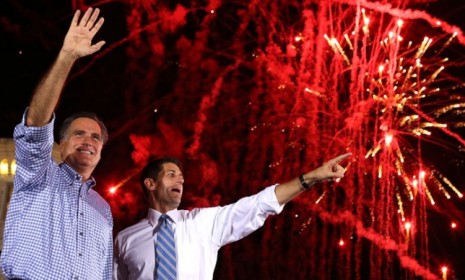The state of the race


A free daily email with the biggest news stories of the day – and the best features from TheWeek.com
You are now subscribed
Your newsletter sign-up was successful
On paper, President Obama still has more paths to 270 electoral votes. His firewall, which is more like a rez-de-chaussee of his political strategy, is holding: He leads (still solidly) in Ohio, Wisconsin, and Iowa. From the standpoint of enthusiasm, the electorate is bleeding red. GOP fervor remains undiminished, and it has spread across the battleground states.
Because (I think) voters process through information very quickly, late enthusiasm, which Romney has, galvanizes undecided voters, who want to be with the winner. I tend to think that truly undecided voters are a tiny slice of the electorate, and that most people who insist they're undecided now are just folks with a partisan complex. They fear that by identifying with a particular candidate, they're identifying with a certain history; being for Obama endorses his take on what happened over the past four years. Being for Romney aligns that voter with the Romney version of recent history.
I do think that most of Romney's gains have come from Republican-leaning independents who are more comfortable identifying with Romney now, a direct result of his presidential bearing during the first debate. "Chicago" is not panicking because the composition of these new Romney voters is not the composition of the Obama electorate.
The Week
Escape your echo chamber. Get the facts behind the news, plus analysis from multiple perspectives.

Sign up for The Week's Free Newsletters
From our morning news briefing to a weekly Good News Newsletter, get the best of The Week delivered directly to your inbox.
From our morning news briefing to a weekly Good News Newsletter, get the best of The Week delivered directly to your inbox.
A word about strategy: The most interesting number in the latest NBC News/Wall Street Journal poll has 62 percent of the electorate begging for a major change in policy of the next four years. That number obviously includes Democrats. Right now, Obama's campaign is pounding Mitt Romney for having a plan (fact: he has one) that doesn't add up or furthers the plutocracy. Fine. But the line of attack that Romney is using — that the only thing Barack Obama offers is more of the same — is more damaging, because even a lot of voters who already support President Obama really want to see something different from him. Obama does have a "plan," but his team has decided that it's not a priority right now to communicate it. That may be a mistake.
A free daily email with the biggest news stories of the day – and the best features from TheWeek.com
Marc Ambinder is TheWeek.com's editor-at-large. He is the author, with D.B. Grady, of The Command and Deep State: Inside the Government Secrecy Industry. Marc is also a contributing editor for The Atlantic and GQ. Formerly, he served as White House correspondent for National Journal, chief political consultant for CBS News, and politics editor at The Atlantic. Marc is a 2001 graduate of Harvard. He is married to Michael Park, a corporate strategy consultant, and lives in Los Angeles.
-
 The ‘ravenous’ demand for Cornish minerals
The ‘ravenous’ demand for Cornish mineralsUnder the Radar Growing need for critical minerals to power tech has intensified ‘appetite’ for lithium, which could be a ‘huge boon’ for local economy
-
 Why are election experts taking Trump’s midterm threats seriously?
Why are election experts taking Trump’s midterm threats seriously?IN THE SPOTLIGHT As the president muses about polling place deployments and a centralized electoral system aimed at one-party control, lawmakers are taking this administration at its word
-
 ‘Restaurateurs have become millionaires’
‘Restaurateurs have become millionaires’Instant Opinion Opinion, comment and editorials of the day
-
 Why Puerto Rico is starving
Why Puerto Rico is starvingThe Explainer Thanks to poor policy design, congressional dithering, and a hostile White House, hundreds of thousands of the most vulnerable Puerto Ricans are about to go hungry
-
 Why on Earth does the Olympics still refer to hundreds of athletes as 'ladies'?
Why on Earth does the Olympics still refer to hundreds of athletes as 'ladies'?The Explainer Stop it. Just stop.
-
 How to ride out the apocalypse in a big city
How to ride out the apocalypse in a big cityThe Explainer So you live in a city and don't want to die a fiery death ...
-
 Puerto Rico, lost in limbo
Puerto Rico, lost in limboThe Explainer Puerto Ricans are Americans, but have a vague legal status that will impair the island's recovery
-
 American barbarism
American barbarismThe Explainer What the Las Vegas massacre reveals about the veneer of our civilization
-
 Welfare's customer service problem
Welfare's customer service problemThe Explainer Its intentionally mean bureaucracy is crushing poor Americans
-
 Nothing about 'blood and soil' is American
Nothing about 'blood and soil' is AmericanThe Explainer Here's what the vile neo-Nazi slogan really means
-
 Don't let cell phones ruin America's national parks
Don't let cell phones ruin America's national parksThe Explainer As John Muir wrote, "Only by going alone in silence ... can one truly get into the heart of the wilderness"
